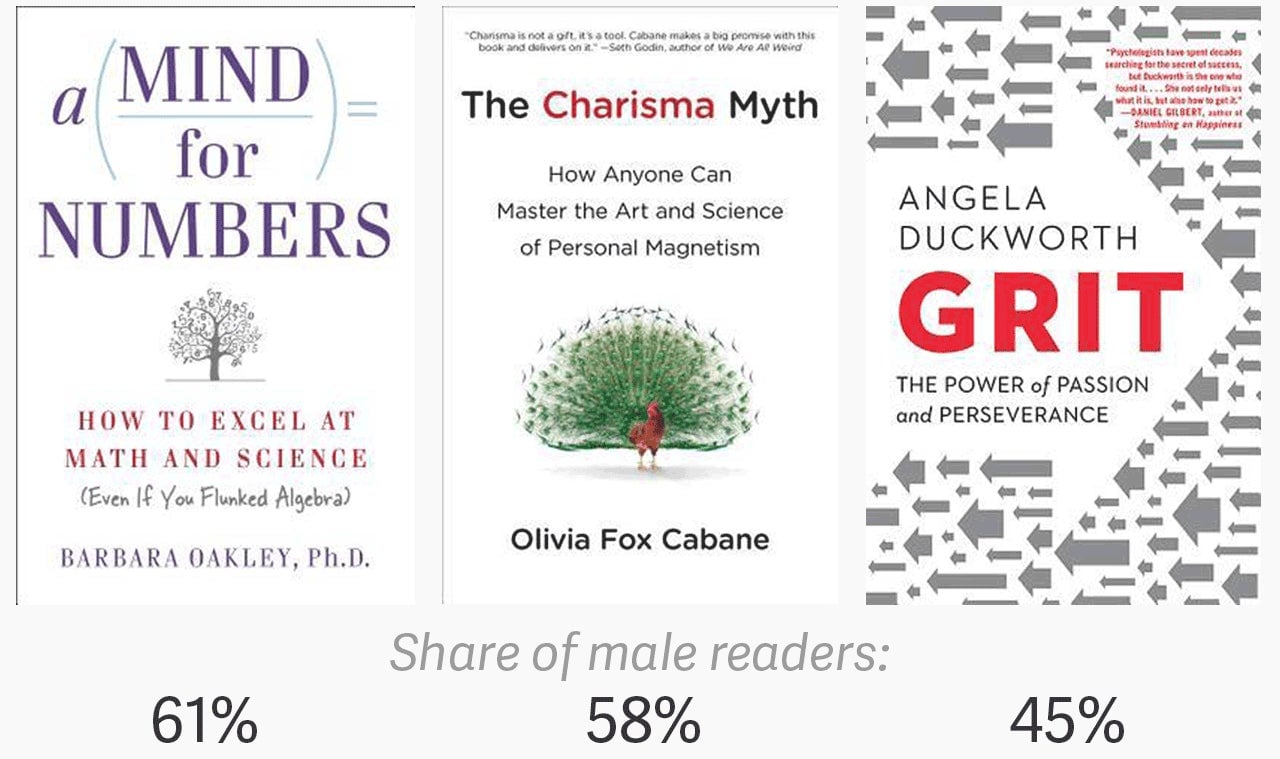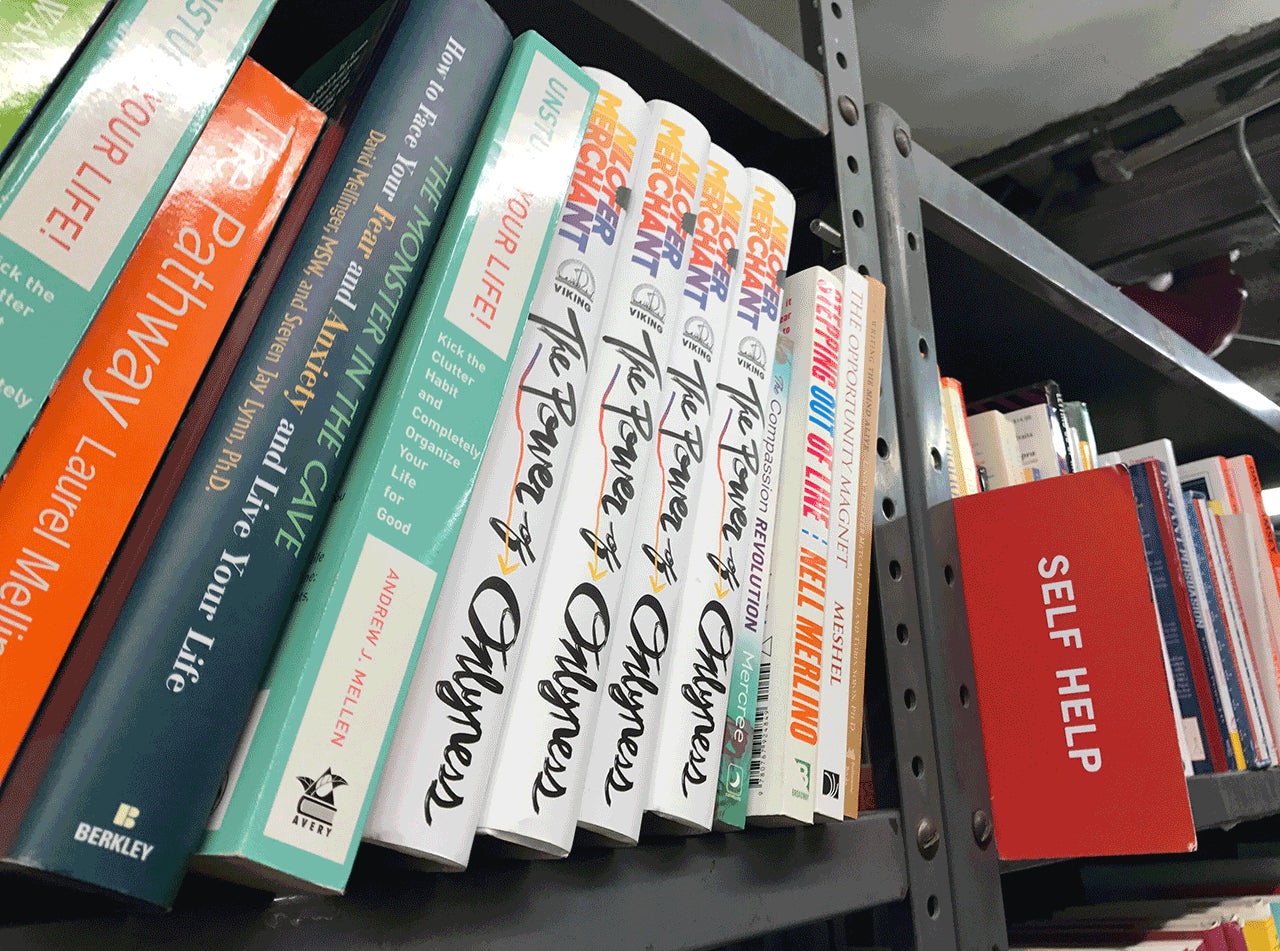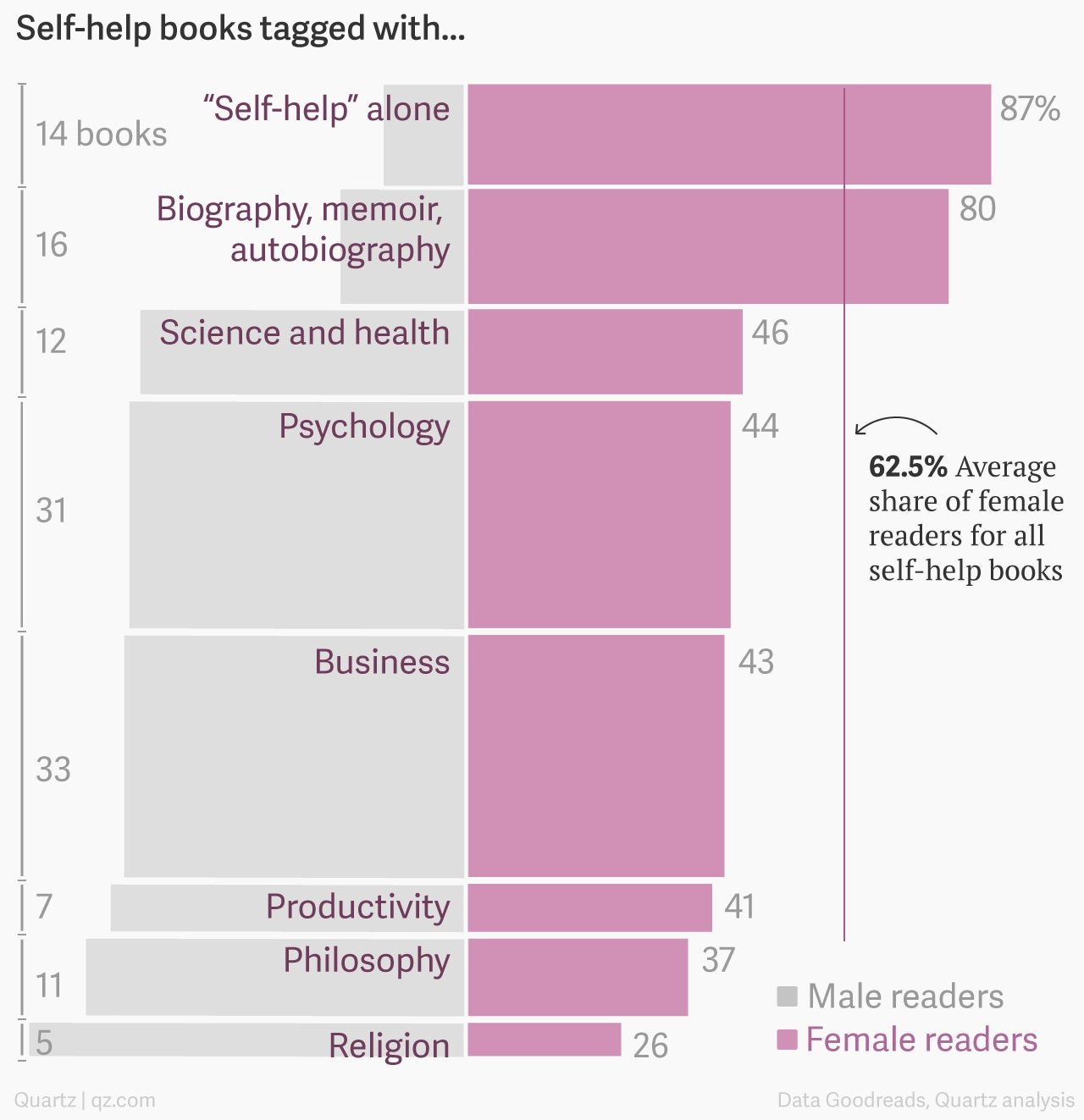Goodreads data show that women reading self-help books are getting advice from men
There’s a new sexist cliché; Not only don’t men want to ask for directions when they get lost, market research suggests that they don’t read self-help books, either. Or at least admit to it. As Alain de Botton wrote in a Guardian column: “Anyone wanting to damage their intellectual credentials at a stroke need only do one simple thing: confess they read self-help books.”


There’s a new sexist cliché; Not only don’t men want to ask for directions when they get lost, market research suggests that they don’t read self-help books, either. Or at least admit to it. As Alain de Botton wrote in a Guardian column: “Anyone wanting to damage their intellectual credentials at a stroke need only do one simple thing: confess they read self-help books.”
Men may also fear they’ll be judged as weak or incompetent spotted at a book store buying “Who Moved My Cheese“, but when it comes to writing self-help books? They’re the primary authors.
To get a better sense of the role gender plays between readers and authors, Quartz analyzed the most-read “self-help” books on Goodreads. We found gender has a huge role in who reads, writes and rates literature.
Reading, writing and gender
Self-help books take a decent share of the best-sellers in bookstores, and sales have been on the rise. At the Washington, DC Public Library, for example, 11 of the top 50 titles with the highest circulation are “self help.”
To analyze the genre, Quartz turned to data from Goodreads, the site where readers go to search and buy books, share reviews and connect to others with similar tastes. Goodreads, owned by Amazon, has 65 million users and says it’s the largest website for readers and book recommendations. According to Alexa, a site that collects web traffic data (also owned by Amazon), it’s the 346th most popular website in the world as of the end of Oct. 2017.
Quartz looked at the 100 most-read books on Goodreads tagged with self-help and of those, were able to identify the gender of 88 authors. We then took the top 500 most popular reviews, and identified the gender of the reviewers by extracting info from profile pages, or by assigning gender using first names. For books with fewer than 500 reviews, we used all available reviews.
Here are the 88 books, divided by author and reader. (You can roll-over the chart to see the name of each book.)
While books by women made up about one-third of the most read self-help books, the remaining two-thirds were written by men. Yet with only a few exceptions, books by women were mostly read by women – on average 83% of readers were women. Books with male authors get an even split of 50% male and female readers.
It’s important to understand a few things about why these percentages in the charts are notable. In the US, women generally read more books than men. On Goodreads, roughly three quarters of readers are women. In our analysis, 62.5% of the reviewers of the most popular self-help books were women. That is a much lower percentage than the share of female reviewers of some other Goodreads genres like romance, adult fiction, chick-lit books, all of which are above 85%, according to one study from the UK (pdf).
What’s special about the genre of self-help, however, is that there are more men writing and more women reading, so the majority of women seeking advice end up getting it from male authors.
There are 27 books by men of which women make up a majority of the readers. They provide practical advice for all aspects of life including how to live well (The Little Book of Hygge: The Danish Way to Live Well, 94%), how to find lasting happiness in a changing world (The book of Joy, 80%), how to live a tidy and minimalistic life (The more of less: finding the life you want with everything you own, 83%.)
On the flip-side, men are less likely to be interested in books by female authors. Only three books written by women see their share of male readers higher than the average (37.5%), and the titles tell the story:

Choosing and rating books
We choose what to read according to recommendations from friends and family, book critics and marketing. We rate books based on our own criteria.
Despite the fact that women read more books by men, our analysis of reviewers and their ratings found that readers prefer books written by authors of their own gender.
The chart below looks at how an author’s gender influences a book’s popularity and rating. The spread shows that books by men are read across gender lines and get higher ratings from men. Books by women are read mostly by women and get higher ratings from women.

Defining self-help
The gender imbalance can partially be attributed to the fuzzy definition of the genre itself. Book genres on Goodreads are assigned by the site’s users. As a result, one book could be listed in multiple genres. This is especially true for self-help books.
Even for librarians, categorizing self-help books is more art than science. The DC Public Library puts them under Applied Psychology 1 according to the Dewey Decimal Classification system. Among the 11 highest circulating self-help books at the library, there are How to win friends and influence people, the 1936 business classic by Dale Carnegie, Quiet, the interpersonal relationship manual for introverts, and Thinking, fast and slow, the psychology book explaining how brain works.
The self-help book shelves at Strand bookstore in New York City have a mix of religion, self-improvement and fitness books.

Michael Santangelo, the Assistant Director of Acquisitions at the New York Public Library told Quartz, that there’s no formal catalog called “self-help” at the library. Some self-help books can be categorized as applied psychology, some can be considered personal finance, and some even business management.
“Some books get more subject categories because we want more people to see them.” Santangelo said.
On Goodreads, a female reader may tag a book as “self-help” but a male reader may tag it something else. To find the most common genres that overlapped with self-help, we took the top four most-tagged genres of each self-help book and identified seven most-overlapping genres.
The chart below shows the number of books tagged with each genre, and if men or women are likely to choose it.

Self-help books tagged with biography, memoir, and autobiography have more female readers. Those tagged with psychology, business, science, philosophy and religion have more male readers. Books tagged with self-help alone see highest percentage of female readers.
The Goodreads data don’t explain if men tend to read fewer self-help books or tag them as such because they don’t want to be associated with the genre, but a 2015 study (pdf) provides some insight.
In the study, researchers from University of Calgary conducted 134 interviews with self-help book readers and found that men and women read self-help books for different reasons. Men are more likely to read books relating to careers, while women are more likely to read books about interpersonal relationships. Overall, women read self-help books more frequently and more intensively.
The study argues that the gender differences in self-help book reading are a result of the changing social roles for women, and the subsequent expectations. Women increasingly take full-time jobs, yet still bear responsibility for most of the housework:
Being on the disadvantaged side of the wage gap makes self-help reading for career-related purposes just as important for women as it is for men. Bearing disproportionate responsibility for domestic labour and emotional work makes self-help reading oriented towards interpersonal relationships more important for women than for men.
Reading across the lines
While there is significant difference between the type of self-help books men and women choose to read, there is agree on the best books within individual categories: the highest-rated books in most genres are the same for both genders.
If you’re looking to find a self-help book to read next – in print or online – we’ve handpicked a selection for you that appeal to both women and men.
Highest-rated self-help books
- Female author: Tiny Beautiful Things: Advice on Love and Life from Dear Sugar
- Male author: The Body Keeps the Score: Brain, Mind, and Body in the Healing of Trauma
- Business: Never Split the Difference: Negotiating As If Your Life Depended On It
- Psychology: The Body Keeps the Score: Brain, Mind, and Body in the Healing of Trauma
- Biography, memoir, autobiography: Tiny Beautiful Things: Advice on Love and Life from Dear Sugar
- Science: How Not to Die: Discover the Foods Scientifically Proven to prevent and reverse disease
- Philosophy, Religion: The Book of Joy: Lasting Happiness in a Changing World
- Productivity: Unlimited Memory: How to Use Advanced Learning Strategies to learn faster, remember more and be more productive
- “Self-help” alone: 365 Days of Wonder: Mr. Browne’s Book of Precepts